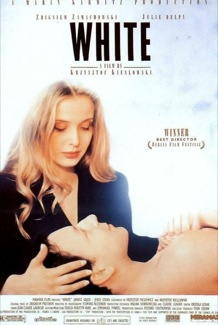Three Colors: White
| Three Colours: White | |
|---|---|

Theatrical release poster
|
|
| Directed by | Krzysztof Kieślowski |
| Produced by | Marin Karmitz |
| Written by | Krzysztof Kieślowski Krzysztof Piesiewicz |
| Starring | |
| Music by | Zbigniew Preisner |
| Cinematography | Edward Kłosiński |
| Edited by | Urszula Lesiak |
|
Production
company |
|
| Distributed by | MK2 Distribution (France) |
|
Release date
|
|
|
Running time
|
87 minutes |
| Country | France Poland Switzerland |
| Language | Polish French Russian English |
| Box office | $1.4 million |
Three Colours: White (French: Trois couleurs : Blanc) is a 1994 French-Polish comedy-drama film co-written, produced, and directed by Krzysztof Kieślowski.White is the second in The Three Colors Trilogy, themed on the French Revolutionary ideals, following Blue and preceding Red. The film was selected as the Polish entry for the Best Foreign Language Film at the 67th Academy Awards, but was not accepted as a nominee.
White is about equality, with the film depicting Karol Karol, a shy man who, after being left by his wife in humiliating circumstances in Paris, loses his money, his residency, and his friends. As a deeply ashamed beggar in Warsaw, Karol begins his effort to restore equality to his life through revenge.
After opening with a brief, seemingly irrelevant scene of a suitcase on an airport carousel, the story quickly focuses on a Paris divorce court where Karol Karol (Zbigniew Zamachowski) is pleading with the judge — the same legal proceedings that Juliette Binoche's character briefly stumbled upon in Blue. The immigrant Karol, despite his difficulty in understanding French, is made to understand that his wife Dominique (Julie Delpy) does not love him. The grounds for divorce are humiliating: Karol was unable to consummate the marriage. Along with his wife, he loses his means of support (a beauty salon they jointly owned), his legal residency in France, and the rest of his cash in a series of mishaps, and is soon a beggar. He only retains a 2 franc coin.
...
Wikipedia
